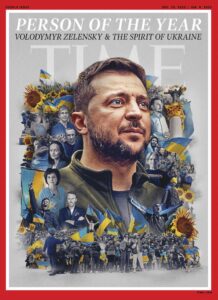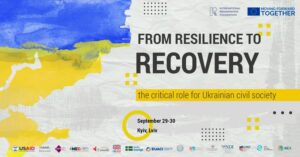Russia’s invasion of Ukraine is a stark reminder that corrupt regimes are among the worst perpetrators of human rights violations and abuses, said U.S. Secretary of State Antony Blinken.
“The United States is taking dozens of actions to promote accountability for corruption and human rights abuse around the world,” he observed on the occasion of International Anti-Corruption Day and on the eve of Human Rights Day. “In doing so, we are using a range of accountability tools, including Global Magnitsky sanctions and the Department of State’s Section 7031(c) visa restriction authority, to designate more than 65 individuals and entities connected to corruption and human rights abuses in 17 countries.”
 Ukrainian President Volodymyr Zelenskyy, TIME magazine’s Person of the Year, is urging the international community to establish a special tribunal for the crime of aggression in order to prosecute Russia’s political and military leadership. The move reflects concerns that existing international criminal courts will be unable to hold the Kremlin fully accountable for Russian crimes committed in Ukraine, the Atlantic Council reports.
Ukrainian President Volodymyr Zelenskyy, TIME magazine’s Person of the Year, is urging the international community to establish a special tribunal for the crime of aggression in order to prosecute Russia’s political and military leadership. The move reflects concerns that existing international criminal courts will be unable to hold the Kremlin fully accountable for Russian crimes committed in Ukraine, the Atlantic Council reports.
Zelenskyy reiterated his call for a special tribunal during an event hosted by the United States Institute of Peace, the Atlantic Council, and the Ukrainian Embassy in keynote remarks delivered on Zelenskyy’s behalf by presidential chief of staff Andriy Yermak.
Ukraine’s finance minister says crucial Western financial support is “not charity” but “self-preservation” in the fight to defend democracy as his country deals with growing costs to repair electrical and heating infrastructure wrecked by Russian attacks.
Serhiy Marchenko told The Associated Press that he believes European Union officials will sort out a dispute with Hungary that has blocked a key 18 billion-euro ($18.97 billion) aid package, which would cover much of Ukraine’s looming budget gap.

Credit: NDI
What is at stake in Ukraine is not just Ukraine’s existence but Europe’s security architecture, with its core principles of territorial integrity, sovereignty, and prohibition of the use of force, says Kaja Kallas, Prime Minister of Estonia.
We cannot allow the fundamental principles of the UN Charter and the European security architecture to be trampled underfoot. For that reason, Ukraine must win, the Russian aggressor must fail, and war criminals must face justice. No peace that is reached before these goals are achieved can ensure anyone’s security, she writes for Foreign Affairs.
Bernard-Henri Lévy (above) explains what’s at stake in Ukraine. “Ukraine can not lose. But it must be helped to win,” he says at the end of his powerful new film, Why Ukraine, which will be released in the US later this year. Democracy itself is at stake, Lévy insists.







